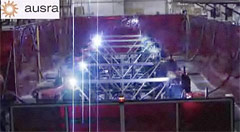Ausra has flipped the switch to start the first solar thermal power manufacturing plant in North America. The 130,000-square-foot facility uses robotics and employs 25 workers to assemble solar thermal mirrors, tubes and turbines for solar power plants. It will employ 50 workers when running at full capacity.
Ausra uses flat glass to focus the heat of the sun, make steam and spin turbines that make electricity. Its solar power plants are built to produce power for utilities, and one of its first projects is a 177-megawatt solar farm in California that will provide power to Pacific Gas and Electric Co.
The Las Vegas assembly plant is building mirrors for a 5-megawatt Ausra solar thermal project plant in central California. Ausra could use the plant to make components for industrial customers who need solar energy to generate steam for food processing or oil production.
But it may take longer to find solar power developers ready to buy the components made in Las Vegas.
Robert Boehm, director of the Center for Energy Research at the University of Nevada, Las Vegas, sees two big problems confronting the solar thermal industry: The need for Congress to extend the 30 percent federal tax credits for solar power and the Bureau of Land Management's suspension on acceptance of applications for solar plant sites.
Access to federal land is crucial for the solar thermal power industry in Nevada, Boehm said, because the government owns most of the land in the state.
Reid used the opening ceremony to say he expects to reverse the May 29 BLM decision to stop accepting applications for large-scale solar energy projects on federal lands.
"It may take a few months but it will be reversed because it is against common sense and against fairness," Reid told Bloomberg News. "There are millions and millions of acres that now are available to oil companies."
Applications for utility-scale solar plants on U.S.-owned lands in Arizona, California and three other Western states won't be accepted until completion of a study on the environmental effect of such projects, the bureau said.
Ausra CEO Robert Fishman said his company, which builds solar plants and the components for solar plants, already has made applications for several sites. But he is unhappy about the BLM's refusal to accept new applications now.
"It was a ridiculous decision," Fishman said.
Rhone Resch, president of the Solar Energy Industries Association, is optimistic about the second hurdle, expiring solar tax credits. He predicted that Congress would pass solar energy tax credits by September, because it would be bad politically not to pass the bill, which would extend the credits for eight years.
Solar power will "stabilize energy prices and put Americans back to work in tough economic times," Resch told about 60 attendees at the grand opening.
Reid has called seven times for a Senate vote on measures to extend credits for solar power plants, Resch said. Sen. John McCain, the presumptive Republican presidential nominee, missed all seven votes, but presumptive Democratic presidential nominee Barack Obama has voted for solar tax credits all but one time, he said.
Failure to renew the solar tax credit would slow projects under development, Fishman said.
"You're going to put the brakes on the industry just as it starts to accelerate," Fishman said.
Even if the legislative and regulatory problems are solved, Las Vegas could lose its lead in solar energy manufacturing to another city in the Southwest or overseas. Resch said Germany and Spain enacted tax incentives that remain in place for 20 years.

